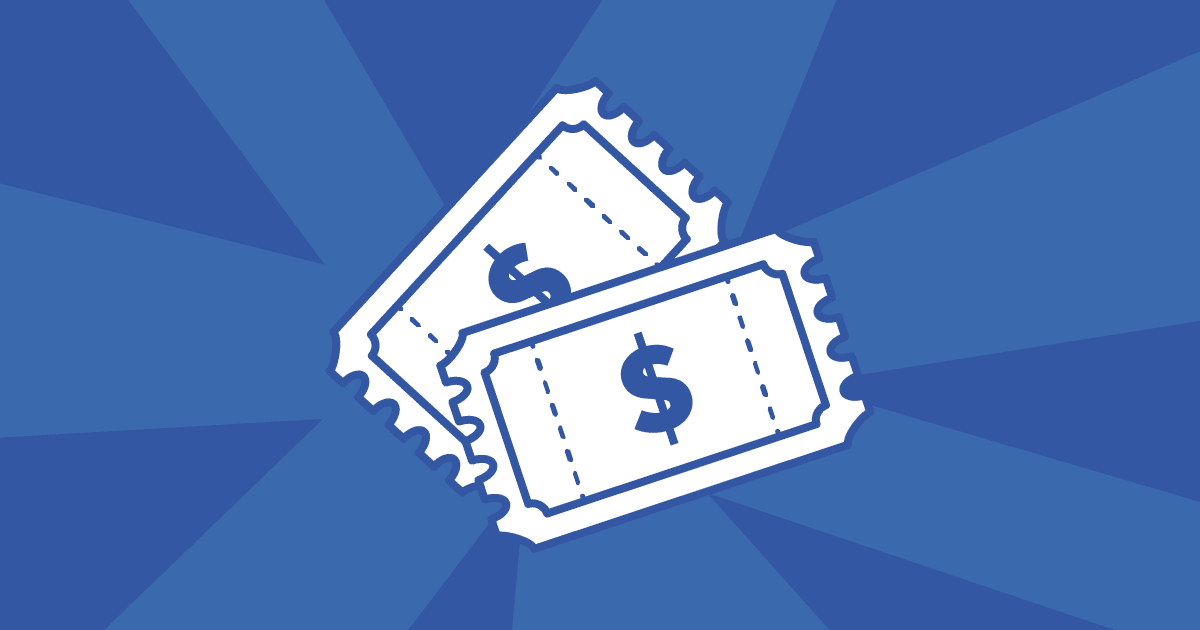Planning an event is like crafting a masterpiece – every detail and decision contributes to the overall success (and profit!). But how can you make sure that your event resonates with both attendees and your long-term business goals?
Fear not, fellow event planners! In this article, we’re going to cover 5 essential things to think about when it’s time to calculate those ticket prices.

Your goals.
How will this event fit into your overall brand strategy?
Think about the goals you have for your upcoming events and brand overall. Some event planners may focus on raking in as much revenue as possible, while others want to build a strong community. By keeping your eyes on the prize, you can make better decisions when it comes to your budget, venue size, and ticket prices.
If you want to make a nice profit, then your event should be the bee’s knees to get attendees through the door. On the other hand, if you’re focused on building your audience with a smaller budget to work with, you may opt for a smaller event. Pop-up events can also be a great, budget-friendly option!
Whatever your goals are, be sure they’re clear with the SMART method. SMART is an acronym for smart, measurable, achievable, relevant and time-bound. This can help turn those lofty business goals into a realistic plan of action!

Your costs.
We know it can cost a pretty penny to make all of the magic happen – including the event venue, staff, marketing, and more. However, a huge mistake that many businesses make is not taking the time to calculate costs!
To determine ticket prices, you first need to calculate the break-even point. This is the minimum price to charge per ticket to make sure all costs are covered. Anything above the break-even price = profit! 🙂
To calculate your break-even price, add up the total cost of hosting your event. Next, take the cost and divide it by the amount of tickets you plan to sell. For example, if I host an event that costs $3,000 with 100 tickets available, I need to charge at least $30 per ticket. If I charged $50 per ticket, I would net $2,000 in profit.
If costs are high, selling more tickets (keeping the venue’s total capacity in mind) can lower the break-even point. Now let’s make that sweet cheddar, baby!

Your competitors.
Time to check out what others in your industry are doing – what they’re charging per ticket, how quickly they sell out, and any pricing strategies (hello, early bird special!). This offers insight into how much money customers are willing to shell out for admission to certain events.
Some factors to keep in mind when comparing yourself to your competition: how long they’ve been in business, their customer loyalty, unique features at their events, etc. Established brands can charge more for tickets, because they have proven the event’s value and earned the trust of their audience. Newer companies might choose to charge less to draw a larger crowd and grow a positive reputation.
Comparing yourself to the competition can help you make moves to stand out from what others are doing. A unique experience can be a magnet for event attendees! While doing your research, take note of any unique selling points (USPs) of your competitors and your own event. These are those golden nugget areas of opportunity to strongly appeal to your market.

What your audience wants.
Now it’s time to start thinking about your audience.
Who is your ideal attendee? Who is going to vibe most with your brand and messaging? Consider their spending habits and financial status – factors that impact their willingness to take the plunge on expensive event tickets.
Plus, getting to know your audience is easier than ever thanks to the internet and social media! There are many features added to social platforms all the time. For example, if you are deciding on a new feature to add to your event, polls are a great method to gather audience preferences. You can also tag your posts with a location to help cater to a more local audience.
By understanding your market inside and out, you can offer them exactly what they want.

Your previous experience.
Time to take a stroll down memory lane and take a look at all of your past event experiences! Maybe things were all smooth sailing and went off without a hitch. Maybe things went a little haywire and you had to put on your problem-solving hat. Either way, you’ve earned insight into what makes a great event. Whether you’re a pro or just getting started with hosting events, things can go wrong quickly. Check out this article on how to handle any of those challenges that arise.
Use your previous experience to reflect on how much you charged for tickets in the past and whether that reflected the true value of the event. If you’ve had multiple events, did you see many guests return? Did you sell all available tickets, and how quickly did they go? This experience is what can give you the confidence boost you need to bump up those ticket prices.

Know your own value!
Setting ticket prices isn’t just about covering your costs or undercutting the competition – it’s about the value you know you can bring to the table! First and foremost, you gotta be fair to yourself and your team. So don’t forget about all the features and experiences that make you stand out from the crowd – embrace those unique qualities. After all, if you can’t see how amazing your event is, how can anybody else? Remember: confidence is key.
Good luck with your next event!



